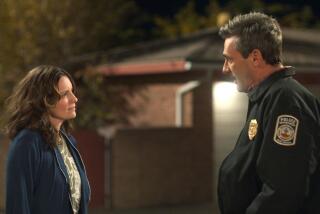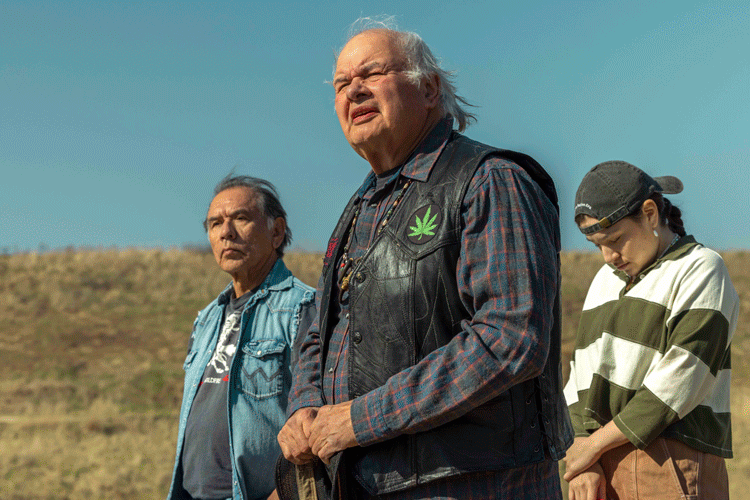‘MacGyver’s’ pop cultural hold on us
- Share via
When Josh and Ada Cottrell were expecting their first child four years ago, they wanted to give their son a name that embodied their beliefs and stood for something attainable. They wanted their little guy to be known not so much as a dreamer but a doer.
So the Sherman Oaks couple named their son … Macgyver.
“We got a lot of flak for it,” Ada says. “People would tell us, ‘You’re setting him up to fail.’ But my husband is a ‘MacGyver.’ And if he’s going to be anything like his daddy, which I’m sure he is, he’s going to be the kind of guy who can put together a sink with a paper clip and some chewing gum and ‘MacGyver’ it, so it’ll work.”
With the “MacGyver” spoof “MacGruber” arriving in theaters Friday — and with movies, TV shows and advertisements continuing to namedrop the ‘80s adventure series — “MacGyver” is enjoying something of a pop culture renaissance. But that would imply that the show, which ended its seven-year network run in 1992, went away in the first place. And it never did.
“MacGyver” followed the exploits of mullet-sporting secret agent Angus MacGyver, a troubleshooter dedicated to using scientific principles (along with a lot of duct tape and his trusty Swiss Army knife) in weekly campaigns against drug lords, dictators and communists. The ABC show established its template with its pilot episode in which MacGyver, among other feats, disarmed a missile with a paper clip, stopped a sulfuric acid leak with a chocolate bar and fashioned an explosive using sodium metal and a cold capsule.
“We verified the viability of the science, but we often stretched the principles,” chuckles “MacGyver” star Richard Dean Anderson who has been playing another hero in Syfy’s “Stargate” franchise for much of the past decade. “That chocolate would have sealed the leak in the sulfuric acid vat. We just would have needed a half-ton of chocolate to make it work.”
Though the show never cracked the Top 20 in ratings, those improvised “MacGyverisms” won a loyal and rather diverse audience that included science geeks, show runners on “The Simpsons” and “Saturday Night Live” writer Jorma Taccone.
“I loved the concept of the guy who uses his wits instead of weapons,” says Taccone, who co-wrote and directed “MacGruber,” a spinoff of the recurring “Saturday Night Live” sketches where a MacGyver-like character dawdles his way through a ticking-time-bomb crisis. Each “MacGruber” episode ends the same way — everyone (presumably) dies in a fiery explosion. (“MacGyver did pause a little too much sometimes while working out his solutions,” Anderson admits.)
Anderson teamed up with the “MacGruber” gang on “Saturday Night Live” and for a series of Pepsi commercials that ran during the Super Bowl in 2009. Three years earlier, Anderson reprised MacGyver during another high-profile Super Bowl commercial for MasterCard. “They had the right tongue-in-cheek approach,” Anderson says of the ads.
“MacGyver” executive producer Henry Winkler, pop culture royalty himself, recognizes MacGyver’s paper clip-gum wrapper-candy bar approach to crime-fighting could be a little silly at times. What captivated people, though, Winkler says, was the character’s ingenuity. “You’d like to think that you too could be that resourceful in a tight situation,” he says.
“I think people have always been fascinated with Angus MacGyver’s basic competence,” says Brendan Vaughn, editor of “What Would MacGyver Do: True Stories of Improvised Genius in Everyday Life.” “Especially for people like me, who can barely hang a photo. Plus, I think people just like to say, ‘MacGyver,’ especially as a verb.”
Though Webster’s dictionary has never officially welcomed “MacGyver” (v. To solve a problem using only the tools at hand) into its pages, the word has become part of the lexicon, popping up in the culture and daily conversation. (Last month’s action movie “The Losers” was the latest to name-check the show.)
“ ‘MacGruber’ came to life mostly because we just liked saying ‘MacGyver,’ ” Taccone says. “MacGyver this. MacGyver that. It’s a great word.”
And while another ‘80s series, “The A-Team,” will get its own feature film this year, “MacGyver” has its own and, arguably, better distinction. The Discovery Channel’s science show “Mythbusters” celebrated its 100th episode by testing the validity of various MacGyverisms.
“We bust myths. MacGyver busts jail cells. What we share is our main tool — science,” says “Mythbusters” executive producer Dan Tapster. “There’s a lot of common ground. We could devote a whole season to just testing ‘MacGyver’ science.”
And how did the MacGyverisms hold up? The myth busters proved that you can indeed pick a lock using the filament of an incandescent light bulb and build an electromagnet using household batteries, tape and insulated wire. MacGyver’s trademark cold capsule bomb didn’t pass muster, though, failing to blow a hole in a cinderblock wall.
The episode scored record ratings, prompting the “Mythbusters” team to begin sifting through more MacGyverisms to test. The show’s hold on our imagination seems as strong as the time MacGyver stapled the bad guy’s coat to the ground to pin him.
“ ‘MacGyver’ highlighted that science could be cool,” Tapster says. “There was always a grain of truth to what he was doing. It wasn’t complete nonsense. That was important. And the mullet. Let’s not forget the mullet. That was equally important too.”
More to Read
The biggest entertainment stories
Get our big stories about Hollywood, film, television, music, arts, culture and more right in your inbox as soon as they publish.
You may occasionally receive promotional content from the Los Angeles Times.











